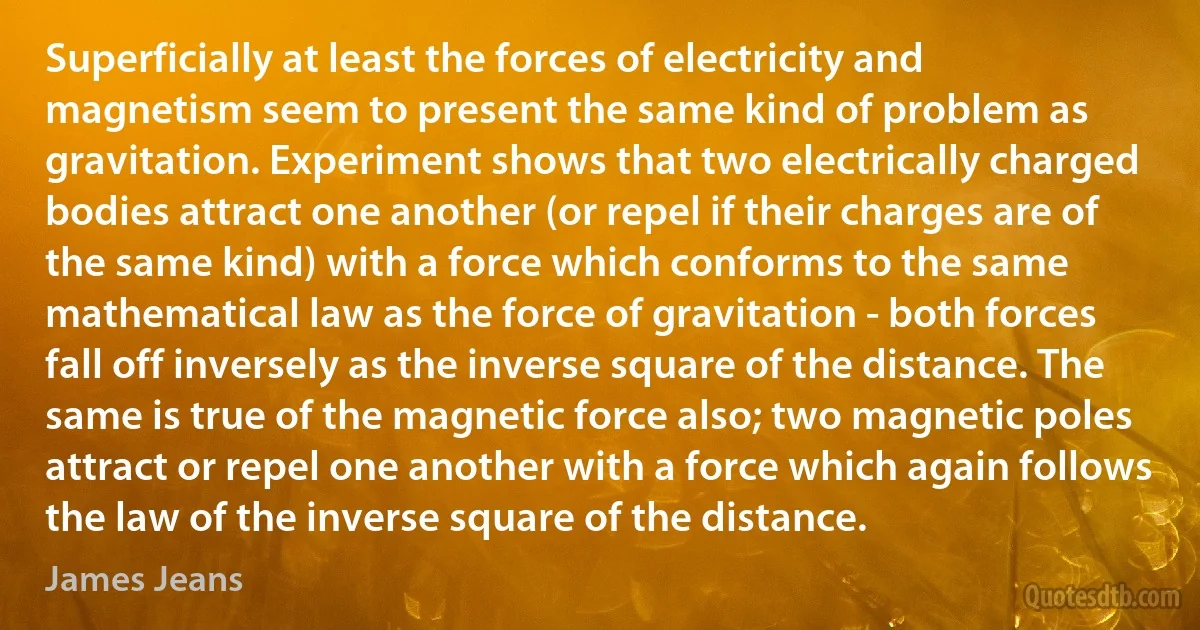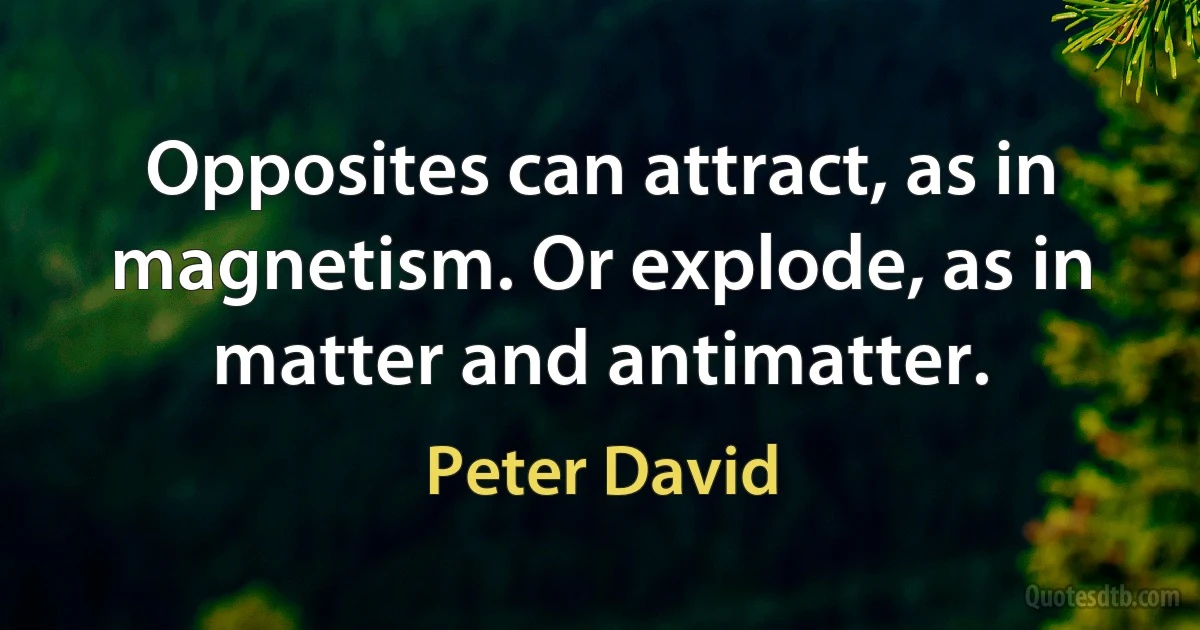Magnetism Quotes
To have "It", the fortunate possessor must have that strange magnetism which attracts both sexes. He or she must be entirely unselfconscious and full of self-confidence, indifferent to the effect he or she is producing, and uninfluenced by others. There must be physical attraction, but beauty is unnecessary.

Elinor Glyn
What a person feels within themselves and about themselves radiates from them. Trust me, I have worked with people - both men and women - who are not what most would consider conventionally attractive, but who exude such a magnetism about them that people are compelled to watch them on stage or screen.

Amanda Schull
Who is there that can recognize real intellect, and do reverence to it; and discriminate it well from sham intellect, which is so much more abundant, and deserves the reverse of reverence? He that himself has it!-One really human Intellect, invested with command, and charged to reform Downing Street for us, would continually attract real intellect to those regions, and with a divine magnetism search it out from the modest corners where it lies hid. And every new accession of intellect to Downing Street would bring to it benefit only, and would increase such divine attraction in it, the parent of all benefit there and elsewhere!

Thomas Carlyle
Our understanding of the four basic concepts of Physics -- space, time, matter and force -- has undergone radical change in the course of work on unification, starting with Maxwell's unification of electricity with magnetism, all the way to present day string theory. What started as four independent concepts, with space and time postulated and the possible forms of matter and force arbitrarily chosen, now appear as different aspects of a rich and novel dynamically determined structure.

Peter Freund
No girl, however coolly her blood may flow, can be pressed to a man's breast, wildly throbbing with love for her, and not experience some agitation in consequence. Whatever may be the state of her sentiments, there is a magnetism in such a contact which she cannot at once throw off. That kiss had brought her relations with Henry to a crisis. It had precipitated the necessity of some decision. She could no longer hold him off, and play with him. By that bold dash he had gained a vantage-ground, a certain masterful attitude which he had never held before. Yet, after all, I am not sure that she was not just a little afraid of him, and, moreover, that she did not like him all the better for it.

Edward Bellamy
Our native love of reality joins with this experience to teach us a little reserve, and to dissuade a too sudden surrender to the brilliant qualities of persons. Young people admire talents or particular excellences; as we grow older, we value total powers and effects, as, the impression, the quality, the spirit of men and things. The genius is all. The man, - it is his system: we do not try a solitary word or act, but his habit. The acts which you praise, I praise not, since they are departures from his faith, and are mere compliances. The magnetism which arranges tribes and races in one polarity, is alone to be respected; the men are steel-filings.

Ralph Waldo Emerson
His [Sarpi's] career soon revealed another cause of his return; he evidently felt the same impulse which stirred his contemporaries, Lord Bacon and Galileo, for he began devoting himself to the whole range of scientific and philosophical studies, especially to mathematics, physics, astronomy, anatomy, and physiology. In these he became known as an authority, and before long was recognized as such throughout Europe. It is claimed, and it is not improbable, that he anticipated Harvey in discovering the circulation of the blood, and that he was the forerunner of noted discoverers in magnetism. Unfortunately the loss of the great mass of his papers by the fire which destroyed his convent in 1769 forbids any full estimate of his work; but it is certain that among those who sought his opinion and advice were such great discoverers as Acquapendente, Galileo, Torricelli, and Gilbert of Colchester, and that every one of these referred to him as an equal, and indeed as a master.

Andrew Dickson White
The Effect of Meditation. Remember also that every one who meditates upon the Master makes a definite connection with him, which shows itself to clairvoyant vision as a kind of line of light. The Master always subconsciously feels the impinging of such a line, and sends out in response a steady stream of magnetism which continues to play long after the meditation is over. The methodical practice of such meditation and concentration is thus of the utmost help to the aspirant, and regularity is one of the most important factors in producing the result. It should be undertaken daily at the same hour, and we should steadily persevere with it, even though no obvious effect may be produced. When no result appears we must be especially careful to avoid depression, because that makes it more difficult for a Master's influence to act upon us, and it also shows that we are thinking of ourselves more than of him.

Charles Webster Leadbeater
The recipe for creating anything is really quite simple. Take good or bad feelings (meaning positive or negative vibrations), bake with varying degrees of emotion to increase magnetism, and here comes what we've attracted, like it or not. What we have focused on, and how we have vibrated about it, is what we have gotten... from birth.

Lynn Grabhorn
Gradually... during the second half of the nineteenth century, the uncomfortable feeling of dislike of the action at a distance, which had been so strong in Huygens and other contemporaries of Newton, but had subsided during the eighteenth century, began to emerge again, and gained strength rapidly.
This was favoured by the purely mathematical transformation (which can be compared in a sense with that from the Ptolemaic to the Copernican system), replacing Newton's finite equations by the differential equations, the potential becoming the primary concept, instead of the force, which is only the gradient of the potential. These ideas, of course, arose first in the theory of electricity and magnetism or perhaps one should say in the brain of Faraday.

Willem de Sitter



